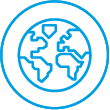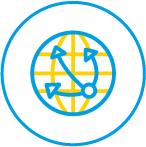SOCIAL IMPACTS AND COMMUNITY RELATIONSHIPS
SABIC invests in social impact and community relationships through its CSR initiatives and national social responsibility strategy.
SABIC’s CSR program contributes to 10 United Nations Sustainable Development Goals, three Saudi Vision 2030 pillars, and is focused on four key priority areas: Health & Wellness, Science & Technology Education, Environmental Protection, and Water & Sustainable Agriculture. Across the year, we invested over US$ 33.56 million in 127 Global CSR programs, reaching around 345,000 people in 26 countries.
CORPORATE SOCIAL RESPONSIBILITY INITIATIVES
-
Global CSR Programs

127
-
invested in US$

33.56M
-
people reached in 26 countries

345,000

Our Global Corporate Social Responsibility activities address specific community needs in each country.
HEALTH AND WELLNESS

A SABIC employee participates in a blood-donation campaign in Saudi Arabia.
Our focus on Health & Wellness encompasses our Global Health Initiative and our Global Social Initiative and seeks to promote a broad, holistic concept of wellbeing in the communities in which we work and in society at large. In 2021, we delivered 65 health and wellness programs globally, providing relief efforts to mitigate the impact of COVID-19 on families and communities but attending to a range of other areas as well. Our programs in Health & Wellness reached 19 countries – KSA, UAE, China, Vietnam, USA, Argentina, Brazil, India, the Netherlands, Germany, Spain, UK, Austria, Italy, Poland, Hungary, France, Croatia, and Belgium.
SABIC also recognizes the need to prioritize mental health alongside physical health. For the second year, we sponsored the National Award for Mental Health Promotion and honored the winners on World Mental Health Day at our Riyadh headquarters. In the same spirit, SABIC employees and volunteers in Saudi Arabia and in China organized visits to hospitals and elderly care centers, bringing food and traditional festival gifts for those without families.
An autism center in Madinah, Saudi Arabia was launched in 2021 with support from SABIC. It specializes in early diagnosis and intervention of childhood autism as well as in increasing public awareness of the disorder.
The Halfway Home Center, a first-of-its-kind in the Kingdom drug rehabilitation center in cooperation with the Ministry of Health and Diriyah Governorate in Riyadh, was launched this year helping recovered addicts to be productive members of the community and reintegrate fully into society. The center is part of larger antidrug efforts by SABIC which include NEBRAS awareness campaigns digitally and in public locations, and virtual games to build and enhance community knowledge about the dangers of drugs.
ENVIRONMENTAL PROTECTION

We launched the Halfway Home Center, a drug rehabilitation center, to help recovered addicts reintegrate into society.
In 2021, we identified and contributed to addressing key environmental issues through effective partnership and engagement in communities where we operate and our employees live. Our Global Environmental Protection Initiative reached 16 countries – KSA, Lebanon, USA, Mexico, Brazil, UK, the Netherlands, Germany, Spain, Austria, Italy, Poland, Hungary, France, China, and Singapore.
Under the Global Clean4Change program, our employees and their families engaged in extensive clean-up activities across 13 countries globally.
On World Clean-up Day SABIC employees and family members cleaned up over 450 kg of waste in cities across Saudi Arabia in collaboration with Diryah Gate Development Authority, Municipality of Yanbu, and Royal Commission of Jubail and Yanbu.
In Saltholme, UK, the water supply to the RSPB Saltholme Nature Reserve & Wetlands Centre was in urgent need of renovation. SABIC stepped in to provide the resources to ensure that the birds and wildlife continue to flourish. In the US, we supported the Houston Wilderness alliance in conjunction with Earth Day in their tree-planting effort to combat flooding and erosion and absorb air pollution for the ecoregions of the coastal prairies, forests, wetlands, and waterways around Houston, Galveston Bay, and the Gulf of Mexico.
WATER AND SUSTAINABLE AGRICULTURE
Water source and sanitation management go hand in hand with better food and energy production and are key to ending hunger, achieving food security, and improving nutrition. At SABIC, we support farmers and technical specialists meet and share ideas and experiences on effective farming practices, crop productivity, quality, and variety. This year, we sponsored Coffee Bean Al Dayer Festival, and a citrus festival in Al Hariq. In partnership with King Saud University and Diriyah Governance, SABIC also supported a Palm Tree Waste Utilization Project in Saudi Arabia to optimize the value proposition of agricultural waste. In Jubail, we launched an awareness campaign focusing on water use reduction habits along with interactive virtual games for children, and the public learned how water is purified locally from wastewater which can be reused for industrial cooling and agriculture.
SCIENCE & TECHNOLOGY EDUCATION
A quality education and lifelong learning have always been prime values for SABIC. Our goal is to foster innovation, particularly through scientific and technology education, and we have kept up the momentum despite the unique challenges faced this year.
Our Global-Back-to-School Initiative works with charities, NGOs, schools, and communities across the world to help students succeed in their education. In 2021, this initiative reached students in 13 countries – KSA, Morocco, Turkey, Pakistan, USA, Mexico, Brazil, Argentina, the Netherlands, Germany, Spain, China, and India. The focus this year has been on helping children continue their schooling despite the challenges of COVID-19.
In China, we set up ChemWorkshop, a virtual workshop in collaboration with China Petroleum and Chemical Industry Federation (CPCIF) to address talent shortages within the industry and provide employment opportunities for graduates.
SABIC’s Global Initiative for Education and Innovation also continued in 2021, in partnership with Junior Achievement Worldwide and INJAZ Saudi Arabia. The initiative benefitted students in three countries this year – China, USA, and Saudi Arabia.
In 2021, NUSANED™ focused on the localization of recycling technologies, production of PPE, and defense applications in the local market. Key highlights for the year include:
- The number of candidates qualified to initiate new projects since the launch of NUSANED™ in 2018 reached 143. The annualized GDP impact of opportunities in 2021 was SAR 1.2 billion, reaching a total of about SAR 11.4 billion since the program was launched.
- As a part of Muahal, 5,660 jobs were created in 2021. Out of the more than 11,500 jobs created since the launch of the initiative, 1,937 have been for women.
- The Chinese company, ShenGong, started the first of the fives phases of the largest NUSANED™ project in Jubail, using 43,000 metric tons of SABIC materials to manufacture electrical and electronics parts for power-saving LED lighting, smart electronics, houseware, and automotive. On completion of all the phases, the project is expected to contribute US$ 110 million to the GDP, create 233 jobs and export 70% of the overall production.
- Ten local factories were enrolled in our operational excellence program, Tamayouz, to help local manufacturers optimize their productivity and remove manufacturing bottlenecks, saving approximately SAR 18 million in costs for three projects that applied the program.

